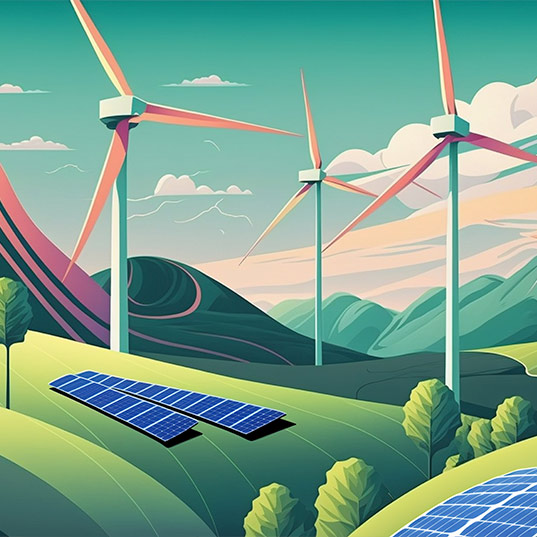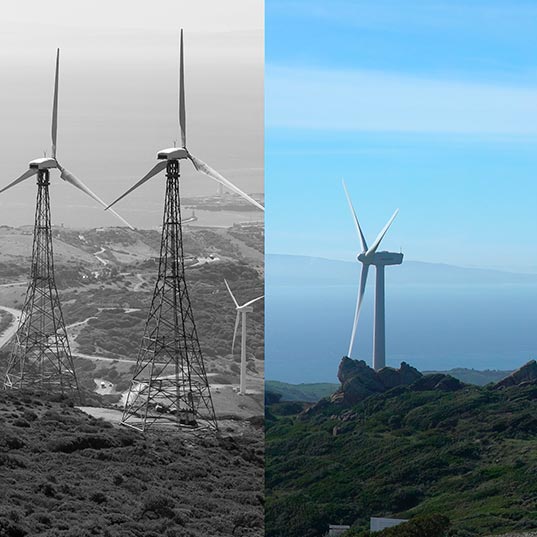Ten reasons to support renewable energy
Among the torrents of arguments, here are 10 to that explain the vital role of clean energies within a sustainable economic model.Debate over the energy model can constantly be heard on the street: advantages and disadvantages of gas, coal and oil, the nuclear controversy, the viability of renewables… Among the torrents of arguments, here are 10 to that explain the vital role of clean energies within a sustainable economic model.
A REAL ALTERNATIVE
Renewables are not a project for the future or an experiment - they are already a reality and production from them, and their range, will steadily increase. According to the World Wind Energy Association, world installed wind power capacity had reached nearly 200,000 MW by the end of 2010, equivalent to 200 nuclear power stations and capable of producing 2.5% of the global electricity demand. In Denmark, wind power already covers 21% of electricity demand and in Spain and Portugal, 18%.
THEY' RE CLEAN
Renewables produce energy without releasing greenhouse effect gases (GHG), making them an indispensable ally in the fi ght against climate change. Governments are looking to advance in this direction due to international commitments such as the Kyoto Protocol, signed by 200 countries and which has the goal of reducing emissions by 5% between 2008 and 2012 (on 1990 levels). Supranational policies are also being applied, such as the objective framed by the European Union: that this reduction reaches 20% in 2020. Recently, the European Commission said it would like to reduce such emissions by between 80% and 95% by 2050 (compared to 1990 levels).
INEXHAUSTIBLE
This is why they're known as renewables! Fossil fuels such as coal, oil and gas do not replenish themselves, whereas sun, water and wind are sources of energy that is always available.
SAFE
Renewable energy generation does not pose risks for people or the environment, which is an advantage with respect to the doubts expressed over the safety of nuclear energy or the concern for pollution associated with fossil fuel use.
AVAILABLE EVERYWHERE
Water, wind and the sun are energy sources that are available the world over. That means that the capacity for generating enough and a variety of renewables comes from indigenous supply base for any country.
As an indigenous resource, they eliminate the need to import fossil fuels from countries rich in gas, and oil. The need to import energy raw materials implies economic, and even strategic, costs. High dependence on energy from abroad can produce supply uncertainty due to political and economic problems in supplier countries.
AVOIDING GEOPOLITICAL CONFLICT
Disputes over the control and ownership of raw materials, which exist in a small number of countries, are one of the main causes of territorial and geopolitical confl icts. Quite the opposite, renewable energies are a distributed resource.
OFFSETTING ECONOMIC UNCERTAINLY
The cost of renewable energies is foreseeable and can be planned for solely on the basis of the necessary investment to exploit them - and not the cost of the raw material. Fossil fuels, especially oil, are subject to large fl uctuations which result in speculation in the markets and upset any planning.
CREATING WEALTH AND JOBS
Renewables are sources of wealth since they avoid imports and, as such, external payments. Having a basic raw material, such as energy, is a good basis for the competitiveness of industry. By nature, renewable energies boost development in rural areas, favoring a better territorial structuring of the countryside, and can act as an industrial and technological motor in the economy. At the end of the day, all this provides the conditions for job creation.
THEY´RE NOT MORE EXPENSIVE
Sun and wind are available without cost, although investment and effi cient technological development has to be carried out to make use of them as energy sources. The present economic model is based on fossil fuels, with a cost structure that penalizes its environmental effects and it is not transparent in the payment of subsidies. Mature renewables technologies, such as wind, would, in fact, already be competitive or even cheaper if all of their environmental costs were internalized.
Spain sets an example
Spain has been a pioneer in promoting renewable energies via the regulatory framework. This commitment has borne fruit, converting renewables into a real alternative for reducing energy dependence on other countries (although it is still over 80%) and creating export technologies and industries.
- Renewables in Spain in 2010:
- Met 32.6% of electricity demand.
- Avoided nearly 32 million metric tons of CO2 emissions.
- Avoided 4 billion euros of imports.
- Cut the trade defi cit by around 8.5%.
- Wind energy already meets the electricity needs of 10 million homes.
- The renewable energies sector has created nearly 100,000 jobs in Spain.
- Two Spanish companies are among the fi ve biggest wind power asset operators in the world, and three are among the fi ve largest in the solar thermal sector.







